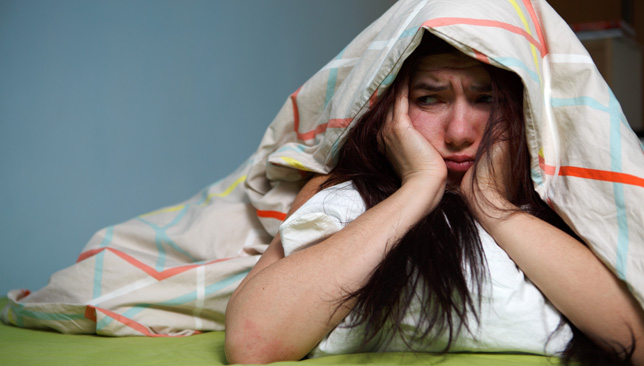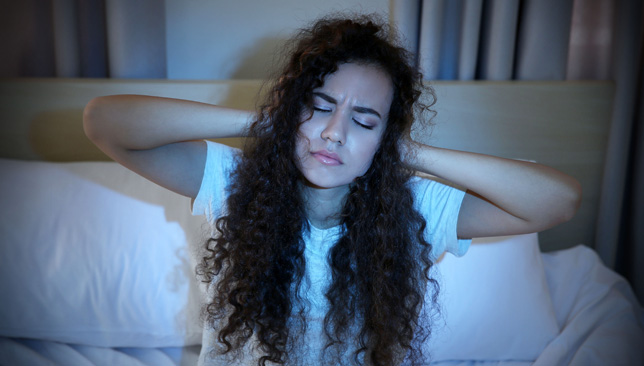
It is 9pm in the evening and just when everyone else is settling down, glass in hand to after dinner TV, I am getting ready to do battle with the night ahead. My stomach is already in knots with anxiety. I have had my sleep-inducing food and alcohol-free unnaturally early evening meal (no later than 7pm), gulped down a magnesium supplement, drunk half a pint of camomile tea, unplugged my computer, switched off my phone and donned amber-tinted glasses to offset the glimmer of any forbidden blue light emanating from electronic devices. In the next hour I take a hot bath with deep-relax bath oil, listen to a guided meditation tape, spray my pillows with lavender, hide my bedside clock and do a few recommended yoga moves. Finally, on goes the eye mask and in go the earplugs. Let battle commence!
Does any of this work? Not often enough, it has to be said, but it’s worth remembering that different remedies work for different people, and there is now a wealth of research into techniques that can help foster sleep, which I list later.
Insomnia has plagued my life ever since I had two babies who cried all night. It has made me feel utterly desperate at times and led to proper depression. Finally, I have found something (a sleeping pill) that works well for me (at the moment) but until recently most of my waking life was dominated by the question of how to get more sleep.
I am not alone in this. In fact a third of people say they suffer from lack of sleep. For society as a whole, it’s a disaster. The financial cost in productivity is immense because either people are too tired to show up for work, or they can’t concentrate when they get there. Fatigue is responsible for thousands of fatal accidents on the road and elsewhere.
Health services are groaning under the weight of patients presenting with stress-related symptoms ramped up by lack of sleep. Doctors daily prescribe sleeping pills for desperate people and around one in ten adults now regularly takes medication for something that should come as naturally to us as breathing.

As individuals, it’s extremely bad news too. Poor sleeping habits are associated with cancer, diabetes, strokes, heart problems, high blood pressure, depression, dementia and obesity (it makes us crave fat and sugar), and a whole heap of mental problems.
Why has this happened? Why do we not sleep like babies? Actually, my babies never slept either so scrub that. Is it because modern life is so hostile to sleep? Psychology Professor Richard Wiseman thinks that it has much to do with living in a 24-hour
world with 24-hour media and internet access. Personally, I don’t browse celebrity gossip at 3am but I am occasionally gripped by a computer game that needs to be solved, in the same way as I used to be gripped by a good book.
Other features of modern life that don’t help are juggling the demands of work and family, agonising about relationships and finances and children and the sorry state of the world, and just the general treadmill of ever increasing pressures and responsibilities. Gone are the good old days when we went to bed when it got dark and got up when it got light.
Now, of course, there are still many people who do sleep well, and there is also a swathe of people who scientists refer to as ‘super-sleepers’. These are the lucky folk who are able to fall asleep when they want, wake up feeling refreshed, and have lots of sweet dreams. Interestingly, they are significantly more likely to be happy, healthy and wealthy.

And then there are the real insomniacs – an ever-growing army of desperadoes. What is the definition of an insomniac? According to most experts, adults aged 18 to 64 need to sleep for seven to nine hours a night. Those older need an hour less.
Children aged six to nine need between nine and 11 hours, but many can get by on eight hours. Teenagers need eight to 10 hours. You can call yourself an insomniac if you sleep for four hours or less, five nights or more.
The vital importance of sleep is, at last, being taken seriously. Major universities have ‘sleep performance’ centres where research is carried out. Many progressive companies provide sleep pods for daytime napping; a slew of ‘sleep spas’ has sprung up where pale-faced wraiths are instructed in the basics of sleep hygiene, learn stressbusting techniques, are fed sleep-inducing diets, do sleep-friendly exercise like gentle yoga and are given individual sleep programmes to follow based on results of a sleep monitor. Busy people wear health gadgets, such as Fitbit or Jawbone to monitor their sleep (although I’m not sure of the value of discovering you only got two hours last night), or use sleep apps like sleepio. com which uses Cognitive Behavioural Techniques (CBT). CBT is in fact the treatment of choice for insomnia in the U.S.
A couple of centuries ago, sleep in the western world was associated with wealth and privilege. Spending hours in bed was not an option for most workers – the working day in 19th century factories often lasted 14 hours. Then, by the end of the 20th century when it was the bankers and technocrats and the successful elite who were working ridiculous hours and the assumption was that you were far too busy and important to sleep for long.

Now, cultural markers have shifted again and sleep is the new, scarce commodity – a luxury item in which only the leisured classes and the unemployed can indulge. Sleep needs careful planning – and careful preparation it seems.
It’s worth re-capping exactly how sleep works. There are two important parts of the sleep-wake cycle. The first is Slow Wave Sleep (Deep Sleep) in which the body relaxes, breathing becomes more regular, blood pressure falls, and the brain becomes less responsive to external stimuli. This phase is critical for body repair and renewal. The pituitary gland releases growth hormone, which stimulates tissue growth and repair. Researchers believe that the immune system is repaired too at this time.
Slow wave sleep is especially important for athletes – many professionals like Roger Federer and LeBron James sleep 11-12 hours a night.
The second phase is REM (Rapid Eye-Movement) sleep which is to the mind what slow wave sleep is to the body. This is when your brain comes to life and dreams. It clears out irrelevant information, boosts your memory by connecting the experiences of the last 24 hours to your previous experiences, and facilitates learning and neural growth. Your body temperature rises, your blood pressure increases, and your heart rate speeds up. Despite all this internal activity, your body hardly moves. Typically, the REM phase occurs in short bursts about three to five times a night.
Without both these phases each night, the body begins to die. The slow wave sleep helps you recover physically, while the REM sleep helps you recover mentally.
Apparently, the body is adept at making up for short-term lack of sleep, but longterm is quite another matter. Your body will struggle to do its best, but it will never be able to turn a deficit into a surplus.